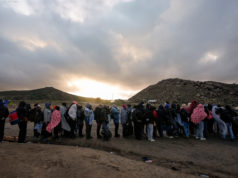Americans didn’t kneel to British tyranny, Nazi fascism, or Soviet communism. We won’t kneel for a collective guilt movement that’s gone off the rails.
Those who live in the far north in author George R. Martin’s “A Song of Ice and Fire” novels live by one principle: “We do not kneel.” They call themselves the “Free Folk.”
That used to be a label that was proudly worn by all Americans. But a still-too-unquestioned movement pushing guilt-by-associated-skin-tone has begun to undo one of this nation’s bedrock ideals.
The kneeling phenomenon demanded by the radical left in the wake of George Floyd’s death—and embraced by those guilted into submission—creates a two-tiered social stratification of “kneelers” and “those who refuse to bend the knee” that’s wholly un-American.
Mobs resulting from years of citizens saturated in “critical race theory” and grievance studies have pressured far too many into believing they bear guilt for the past sins of others. Now they kneel in fealty to that false reality or are exiled from society.
Unfortunately, it’s also moved beyond just kneeling.
A crowd in Webster, Massachusetts, recently forced Police Chief Michael Shaw to lie face-down on the ground for eight minutes. In Cary, North Carolina, a group of Caucasians washed the feet of black organizers to “ask for forgiveness.” Not to be outdone by the latest woke trends, Canadian Prime Minister Justin Trudeau took a knee at a massive anti-racism protest at Parliament Hill in Ottawa.
either figuratively or literally—doesn’t even satisfy the mob.
Minneapolis Mayor Jacob Frey said all the “right” things to the radical leftists holding Guilt Court but was still heckled out of a public square for refusing to defund the police department. The truth is, even mobs tire of the readily subservient and easily obedient.
Deep down, we know kneeling in submission to the whims of mobs or tyrants is wrong. Both our ancient stories and our modern myths reflect this truth.
Instead of bowing to the altar of collective guilt, our exemplars should be Hanania, Mishael, and Azaria—though most know them by their Babylonian names: Shadrach, Meshach, and Abednego.






